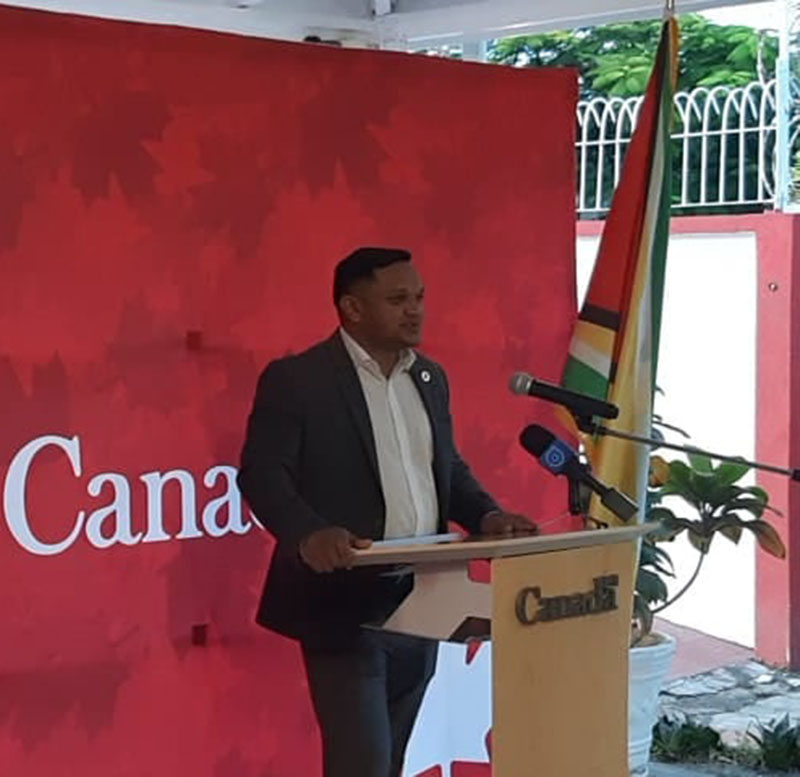Ahead of the impending presentation of Guyana’s local content bill to the National Assembly, Minister of Natural Resources Vickram Bharrat on Thursday evening cautioned businesses against putting the brakes on building their capacity while urging that they form more partnerships so as to better compete in regional and international markets.
“We need to build capacity. If we don’t build capacity, the government passing the Local Content Bill is a waste of time because we will never truly realise the potential of the benefits from the oil sector. So that is the challenge to us… that we continue to build capacity. Not only human capacity… but our local businesses too must build capacity,” Bharrat last evening told a Canada/Guyana Chamber of Commerce (CGCC)-hosted ‘Cocktails and Conversations’ event, where he was the keynote speaker.
“We need to up our game. This is a challenge to all of us. We need to start being competitive regionally and internationally. Let us not look at the Local Content Bill and hide behind it, saying that the IOCs [international oil companies] must buy from us because it is in the law. Let us be competitive. Even though there is a local content legislation in place, let us put it to the IOCs that Guyanese businesses are competitive, in both quality and price, so that it justifies the IOCs doing business with Guyanese and Guyanese companies that would have partnered with investors,” he added.
He said that government realises its duty in ensuring that Guyanese benefit from oil and gas, and the spin-off opportunities that revenue from the sector would bring, and it is why it is important that there be a law instead of a policy. In this way, the minister said, it would guarantee highly qualified Guyanese opportunities of being employed and not having to settle for low tier jobs and locals accessing the provision of goods and services to international companies. “The Local Content Bill is an answer to the question ‘How will we benefit from the oil and gas sector’. It will ensure that Guyanese products find its way on the Unity, Destiny and Prosperity [FPSO vessels]. It will ensure that the produce in Black Bush Polder reaches the Destiny 120 miles offshore Guyana. It will ensure that products and services from Guyanese reaches offshore Guyana. That is what it is designed to do. It is designed to ensure that services that can be provided in Guyana are procured in Guyana,” the minister contended.
Bharrat said that government wants to know that benefits are not limited to just a few persons or regions. “We want to go to Linden or in Region Nine and hear parents say they have a child working on the Unity or Destiny and that is what we want for our Guyanese Children.”
“Local content is all of our responsibility,” he stressed while arguing that the Production Sharing Agreement with ExxonMobil and partners “is lopsided and doesn’t bring benefits to us” and was a key driver in getting the local content into law.
In direct appeal to the country’s private sector and budding entrepreneurs, Bharrat said that while business is competitive, citizens must understand who their real competitors are and unite to build stellar Guyanese products and services.
Even our parents, they need to start educating our children and our small businesses. Our private sector needs to look at each other as partners and not necessarily as competitors. If not, as they say, cat will eat our dinner. This is so because accessing capital or finance is a challenge for us. We can’t run away from that. It is the fact. It is still a challenge for us. Oil and gas is big money business. If we go at it alone, more than likely, we will not be able to compete regionally and internationally. It is why we have always advised that we form ourselves into partnerships, into consortiums, so that we can have more access to capital,” he underscored.
“We can put our heads together and develop the oil and gas sector. Our private sector needs to look at each other as partners in this process. We know that we are competitive people. We like to compete against each other, but now we have to come together and we have to compete with IOCs and foreign investments. That is our competition [but] in a good way. It will help us to grow as a people. That is the only way we can truly enjoy local content and get the benefits from the oil and gas sector,” he added.


